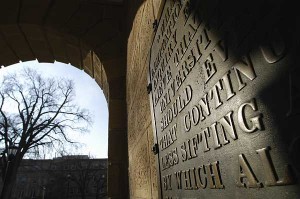Republican Governor Scott Walker and Democratic challenger Mary Burke will face off tonight in the first of two scheduled debates. The debate, sponsored by the Wisconsin Broadcasters Association, will be held at 7 pm in Eau Claire. It will follow a traditional format and be moderated by former Milwaukee broadcaster Jill Geisler.
A list of radio and television stations offering live and delayed coverage is here. Livestream coverage is available on the Wisconsin Public Television and Channel 3000 websites. An archived copy of the debate will also be available on the C-SPAN website.
The second debate will be held next Friday evening in Milwaukee.



